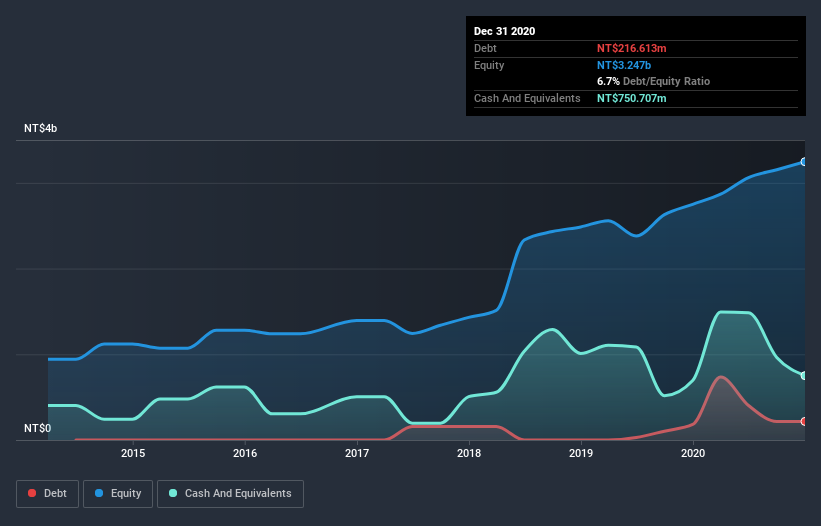Warren Buffett famously said, 'Volatility is far from synonymous with risk.' It's only natural to consider a company's balance sheet when you examine how risky it is, since debt is often involved when a business collapses. As with many other companies CASwell Inc. (TPE:6416) makes use of debt. But the more important question is: how much risk is that debt creating?
When Is Debt Dangerous?
Debt is a tool to help businesses grow, but if a business is incapable of paying off its lenders, then it exists at their mercy. Ultimately, if the company can't fulfill its legal obligations to repay debt, shareholders could walk away with nothing. However, a more usual (but still expensive) situation is where a company must dilute shareholders at a cheap share price simply to get debt under control. Of course, plenty of companies use debt to fund growth, without any negative consequences. When we think about a company's use of debt, we first look at cash and debt together.
View our latest analysis for CASwell
What Is CASwell's Debt?
The image below, which you can click on for greater detail, shows that at December 2020 CASwell had debt of NT$216.6m, up from NT$181.1m in one year. But it also has NT$750.7m in cash to offset that, meaning it has NT$534.1m net cash.

How Healthy Is CASwell's Balance Sheet?
Zooming in on the latest balance sheet data, we can see that CASwell had liabilities of NT$1.35b due within 12 months and liabilities of NT$273.3m due beyond that. On the other hand, it had cash of NT$750.7m and NT$1.14b worth of receivables due within a year. So it actually has NT$273.6m more liquid assets than total liabilities.
This short term liquidity is a sign that CASwell could probably pay off its debt with ease, as its balance sheet is far from stretched. Succinctly put, CASwell boasts net cash, so it's fair to say it does not have a heavy debt load!
Another good sign is that CASwell has been able to increase its EBIT by 28% in twelve months, making it easier to pay down debt. When analysing debt levels, the balance sheet is the obvious place to start. But it is future earnings, more than anything, that will determine CASwell's ability to maintain a healthy balance sheet going forward. So if you want to see what the professionals think, you might find this free report on analyst profit forecasts to be interesting.
Finally, a business needs free cash flow to pay off debt; accounting profits just don't cut it. While CASwell has net cash on its balance sheet, it's still worth taking a look at its ability to convert earnings before interest and tax (EBIT) to free cash flow, to help us understand how quickly it is building (or eroding) that cash balance. In the last three years, CASwell created free cash flow amounting to 16% of its EBIT, an uninspiring performance. For us, cash conversion that low sparks a little paranoia about is ability to extinguish debt.
Summing up
While we empathize with investors who find debt concerning, you should keep in mind that CASwell has net cash of NT$534.1m, as well as more liquid assets than liabilities. And we liked the look of last year's 28% year-on-year EBIT growth. So we don't think CASwell's use of debt is risky. When analysing debt levels, the balance sheet is the obvious place to start. However, not all investment risk resides within the balance sheet - far from it. For instance, we've identified 3 warning signs for CASwell (1 can't be ignored) you should be aware of.
At the end of the day, it's often better to focus on companies that are free from net debt. You can access our special list of such companies (all with a track record of profit growth). It's free.
When trading CASwell or any other investment, use the platform considered by many to be the Professional's Gateway to the Worlds Market, Interactive Brokers. You get the lowest-cost* trading on stocks, options, futures, forex, bonds and funds worldwide from a single integrated account. Promoted
New: AI Stock Screener & Alerts
Our new AI Stock Screener scans the market every day to uncover opportunities.
• Dividend Powerhouses (3%+ Yield)
• Undervalued Small Caps with Insider Buying
• High growth Tech and AI Companies
Or build your own from over 50 metrics.
This article by Simply Wall St is general in nature. It does not constitute a recommendation to buy or sell any stock, and does not take account of your objectives, or your financial situation. We aim to bring you long-term focused analysis driven by fundamental data. Note that our analysis may not factor in the latest price-sensitive company announcements or qualitative material. Simply Wall St has no position in any stocks mentioned.
*Interactive Brokers Rated Lowest Cost Broker by StockBrokers.com Annual Online Review 2020
Have feedback on this article? Concerned about the content? Get in touch with us directly. Alternatively, email editorial-team (at) simplywallst.com.
About TWSE:6416
CASwell
Operates in network security appliance industry in Taiwan, the United States, Israel, China, the United Kingdom, France, and internationally.
Excellent balance sheet second-rate dividend payer.
Similar Companies
Market Insights
Weekly Picks

Solutions by stc: 34% Upside in Saudi's Digital Transformation Leader


The AI Infrastructure Giant Grows Into Its Valuation
Recently Updated Narratives


The "Rare Disease Monopoly" – Commercial Execution Play


The "Landlord of Orbit" – A Deep Value Play Ahead of the Starlab Era


The "AI-Immunology" Asymmetric Opportunity – Validated by Merck (MSD)
Popular Narratives


MicroVision will explode future revenue by 380.37% with a vision towards success


NVDA: Expanding AI Demand Will Drive Major Data Center Investments Through 2026



